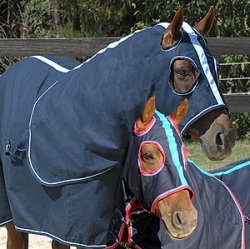Horsezone News
Information About Insect Borne Virus Affecting Horses
 |
| The DPI has advised that rugs with hoods may reduce the risk of mosquito bites (photo: DPI) |
Further to our previous report on the mystery disease affecting horses across NSW and into South Australia and Victoria, Equestrian Australia has been advised by the Department of Agriculture, Fisheries and Forests that the wet spring and summer have resulted in an increased risk of insect borne virus or 'arbovirus' infections in horses.
Veterinarians in Victoria, NSW and South Australia are reporting increased numbers of horses with two distinct disease syndromes:
- Muscle and joint soreness
- Nervous signs
Reports of horses with nervous signs have originated from:
- along the Murray River in Victoria
- the south eastern region of South Australia
- various locations in NSW, including west of the Great Divide, from Mungindi in the north to the Murray River, and a significant cluster in the Hawkesbury Valley west of Sydney and also the Upper Hunter Valley.
Some horses have been severely affected. Most horses with clinical signs recover over several weeks with good husbandry and veterinary care; however, as of 30 March 2011, of the 100 cases in NSW, around 15 have died or have had to be euthanased for animal welfare reasons.
Laboratory testing of samples from the horses with soreness indicates that most infections are probably due to Alphavirus infections including Ross River virus.
Laboratory testing of samples from horses with unusual nervous signs suggests that a majority of cases are due to infection with one or more viruses belonging to the Flavivirus group of viruses that includes viruses like Murray Valley encephalitis virus and Kunjin virus. Testing of samples to date has ruled out Japanese encephalitis virus.
Hendra virus infection has been ruled out from all four states (QLD, NSW, VIC and SA)
Necropsies are taking place on infected dead horses to determine the cause of these infections.
It is important that veterinarians and any assistants take stringent precautions when performing necropsies on horses showing neurological clinical signs. Great care should be exercised when handling brain and spinal cord tissue and appropriate personal protective equipment should be utilised as part of a risk management approach to personal safety.
There has been no increased incidence of muscle/joint soreness or nervous signs in horses reported in Queensland.
Horse owners are urged to reduce the exposure of their animals to insect bites, in particular, mosquitoes.
This can be done by using registered repellent products to reduce insect bites, and through other measures including rugging and the use of fly masks.
Horses suffering from these arboviruses commonly display clinical signs including, but not limited to:
- a reluctance to walk
- a stiff gait
- ataxia (uncoordinated)
- depression
- tremors
- Owners who notice that their horses display unusual signs should immediately contact their private veterinarian.
- Horses are a 'dead-end' host for mosquito-borne arbovirus infections, which means that a horse is not a source of new infection for people or other horses.
For futher information go to http://www.dpi.nsw.gov.au/agriculture/livestock/horses/health/general/nervous
Situation updates and more local information is available on each state’s Department of Primary Industries website:
News Search
Categories
- General
- Event Results
- Stallionzone
- Sponsored Shows
- Clubs
- Health
- Feature Horses
- Competitions
- Five Minutes With Horsezone
- Young Riders
- Reviews
- Training and Clinics
- Postcards from the saddle
- 2014 Equitana by HORSE FIRST
- 2013 Equitana
- 2012 Equitana
- 2012 London
- 2011 Equitana
- 2011 Queensland Floods
- 2010 WEG
